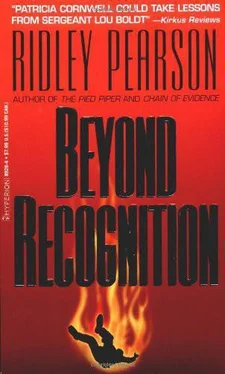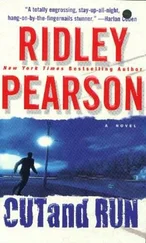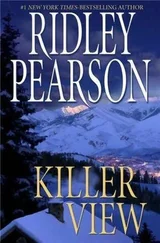Ridley Pearson - Beyond Recognition
Здесь есть возможность читать онлайн «Ridley Pearson - Beyond Recognition» весь текст электронной книги совершенно бесплатно (целиком полную версию без сокращений). В некоторых случаях можно слушать аудио, скачать через торрент в формате fb2 и присутствует краткое содержание. Жанр: Триллер, на английском языке. Описание произведения, (предисловие) а так же отзывы посетителей доступны на портале библиотеки ЛибКат.
- Название:Beyond Recognition
- Автор:
- Жанр:
- Год:неизвестен
- ISBN:нет данных
- Рейтинг книги:5 / 5. Голосов: 1
-
Избранное:Добавить в избранное
- Отзывы:
-
Ваша оценка:
- 100
- 1
- 2
- 3
- 4
- 5
Beyond Recognition: краткое содержание, описание и аннотация
Предлагаем к чтению аннотацию, описание, краткое содержание или предисловие (зависит от того, что написал сам автор книги «Beyond Recognition»). Если вы не нашли необходимую информацию о книге — напишите в комментариях, мы постараемся отыскать её.
Beyond Recognition — читать онлайн бесплатно полную книгу (весь текст) целиком
Ниже представлен текст книги, разбитый по страницам. Система сохранения места последней прочитанной страницы, позволяет с удобством читать онлайн бесплатно книгу «Beyond Recognition», без необходимости каждый раз заново искать на чём Вы остановились. Поставьте закладку, и сможете в любой момент перейти на страницу, на которой закончили чтение.
Интервал:
Закладка:
The daughter answered, “You can make a bomb out of fertilizer and gasoline, Mother. The detective is implying-”
“Nothing,” Boldt interrupted, cutting her off. “I’m not implying anything. Asking questions is all. It might be easier for everyone if we could just deal with the questions rather than jump to conclusions.”
“I see where you’re headed with this,” the victim’s sister cautioned, ignoring his suggestion.
“I don’t,” the mother interjected.
“He thinks maybe Doro was plotting something sinister. He’s a policeman, Mother. They’re all suspicious by nature.”
“Not by nature, by occupation,” Boldt corrected, meeting the daughter’s eye. “I think we’re off to a bad start,” he said. He directed the next question to the mother, hoping to avoid the sister for a moment. The mother glanced at her daughter disapprovingly. “Do you know of any work being done on the house? By the landlord, perhaps?” Boldt asked.
Harriet replied, “No. Not that I’m aware of. She was quite happy there.”
Wanting this over, Boldt asked Claudia, “Any boyfriends out of her past? Anybody you think I might want to speak with?”
“I know you’re only doing your job, Sergeant. I respect that. I apologize. I just don’t think there’s anything to tell you. Doro was a wonderful, loving person. She didn’t deserve this.”
“We don’t know, do we,” the mother asked, “that it was my Dorothy? In the fire, I mean. You people haven’t confirmed that, have you?”
This was the sticking point Boldt had hoped to avoid. The tea and scones were delivered, sparing him an answer. The pit in his stomach had deepened, changing to an ache. The room had lost its glitter; the waitresses had lost a step. The piano sounded a little out of tune on the low end. The glue that held his world together had softened. He felt tawdry, cheap, a gumshoe who lacked empathy and compassion. A woman was dead. No one wanted to talk about it-or even admit it, for that matter. She had had a sad life of late and a sad death and Lou Boldt understood damn well that all the investigating in the world wasn’t going to bring her back. The mother would go on living with her hope that it had been someone else in that fire. The sister would go on defending where no defense was necessary. Boldt would go on with his questions. The victim ruled all his investigations, but ultimately it was not about the victim, it was about the killer, about balance.
Boldt had seen a dead cat by the side of the road earlier in the day, and it had overwhelmed him with a sense of tragic loss. In his mind he transferred Dorothy Enwright, the woman in the photographs before him, to that same place on the side of the road-naked, face down, struck dead. He sat there with his notebook, his pencil, and a haunting determination to find the person responsible. Death made people give up; it made Lou Boldt sit up. He felt bad about that; he didn’t like himself. Dorothy Enwright had no obvious enemies. Boldt could create a dozen scenarios accounting for that fire and that woman in it, but only because he did so day in and day out; his job was to create such situations and pursue them to their outcome, to turn a woman like Enwright into something he could work with.
“You’re not eating,” the mother told him.
“No.”
“You don’t like it?”
Did she mean the scones or the investigation? he wondered, realizing quickly that it didn’t matter; he had the same answer on the tip of his tongue. “No,” said Boldt. With the victim’s finances, correspondence, and paperwork lost in the fire, Boldt requested permission to contact Dorothy’s banks and auditors and look over the accounts. The mother saw nothing wrong with that and agreed.
“I have an image of Doro out in her garden,” said the sister. “You know? The sunlight slanting across her face. She was quite beautiful. Hands working the soil. Weeding, planting. She laughed a lot, Doro did. Used to,” she added. “The last two years took a lot out of her. But I think of her as laughing nonetheless. You know, I have this image, and I don’t even know if it’s real or something I made up to remember her by. And the funny thing is, it doesn’t matter, does it? It’s the image I’m left with. The smile. The contentment at being outdoors and working with plants. The joy of being a mother. She loved little Kenny.”
“It broke her heart when the judge took Kenny away,” the mother said. “I don’t think she ever fully recovered.”
“Was she depressed, drinking, anything like that in the days before the fire?”
Claudia cautioned, “She did not kill herself, Detective. Not intentionally, not accidentally. She kept her gardening supplies in the back shed. You’re out of line.”
“Is that a yes or no to the depression?” Boldt asked, irritated. He kept seeing the cat by the side of the road, then Dorothy Enwright. If there was one thing he had learned early as a homicide investigator, it was how fragile life was, how easily lost. Men stepping out into traffic. Kids playing on the rocks in the hills. Women going home at night to an empty house. One day here, the next day gone. And if the death came with questions attached, it was Lou Boldt’s job to answer them, or to help others to answer them for him. All he needed was a few answers. He couldn’t picture the woman setting fire to a rental house. People did not use fire as a method toward suicide. But he had other problems with Dorothy Enwright. Of chief concern to him was why she had not run from the house when it caught fire; it had not exploded. She had been seen walking inside the house, presumably of her own volition, moments before the blaze. He thought she must have had an opportunity to escape, given the way the fire had burned from a central core outward. It had not trapped her by sealing the doors. Why then had she not escaped?
Had there been someone else in the building with her?
“Dorothy was having problems,” her mother told him, “but she was surprisingly cheerful, wouldn’t you say, dear?”
“Absolutely,” Claudia agreed. “She was a remarkable woman, Detective. She had a great attitude.”
“Who would want to kill her?” the mother blurted out, too loudly for the soft buzz of conversation in the Garden Court. Heads turned. Fortunately, only Boldt saw this.
The two women who sat with him did not see. Their eyes were filled with tears.
8
October second came and nearly went without Ben’s taking any notice of it. Had it not been for Emily, he might have failed to remember its significance. But when he arrived at Emily’s late on the afternoon of the third, she sent him by bus all the way up to Steven’s Broadway News on the corner of Olive and Broadway, where he used the money she gave him to buy copies of the Seattle Times , the Intelligencer , the Tacoma News Tribune , and the Everett Herald .
Back at her purple house, the two of them read headlines and lead paragraphs, back and forth, until Ben asked, “What exactly are we doing?”
“The military man,” she said. “Do you remember him? May thirteenth, 1968.”
“Who?”
“The bad hand.”
Ben remembered the hand.
She said, “He came back for his reading about a week later. You must have been in school. I told him that the stars looked good for a business deal on October second. He was real nervous about it, and I got the feeling his business wasn’t exactly legitimate.”
“So we’re looking for something he might have did.”
“Might have done ,” she corrected. “Yes. He’ll be back, that one. Very superstitious. I’d like to know what it was he did.”
“And you think we may find something in the papers, something about what he did?”
Читать дальшеИнтервал:
Закладка:
Похожие книги на «Beyond Recognition»
Представляем Вашему вниманию похожие книги на «Beyond Recognition» списком для выбора. Мы отобрали схожую по названию и смыслу литературу в надежде предоставить читателям больше вариантов отыскать новые, интересные, ещё непрочитанные произведения.
Обсуждение, отзывы о книге «Beyond Recognition» и просто собственные мнения читателей. Оставьте ваши комментарии, напишите, что Вы думаете о произведении, его смысле или главных героях. Укажите что конкретно понравилось, а что нет, и почему Вы так считаете.












